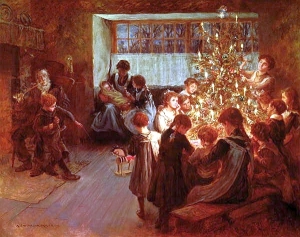This Christmas season, we invite everyone to reread and reconsider the Nativity story (Matthew 1:18-24; Luke 1:26-38, 2:1-20) from a fresh perspective. Since Christians are familiar with the birth narratives, we can sometimes take them for granted, missing key truths. So, take a few extra minutes this year, reread these amazing accounts and marvel at the lessons they reveal about God and our Savior, Jesus. Continue reading
Tag Archives: Christmas
How Could God Become a Man?
Christmas is the time of year when Christians celebrate the birth of Jesus, who they believe is the Messiah (or savior, literally “anointed one”) predicted in the Old Testament. According to Christian orthodoxy, Jesus is actually God incarnate. The doctrine of God becoming human is very clear throughout both the Old and New Testaments (e.g. Isaiah 9:6, Isaiah 7:14, John 1:1-3, John 1:14, Colossians 2:9, Hebrews 1:3, John 20:28).
Many non-Christians question how or if God could become a man. They have many good questions related to this such as: How is it possible for an infinite God to become a finite person? How can God be two people at the same time? Did He stop being God while He was a man? Why would God do this in the first place? As we approach Christmas, it is appropriate to reflect on these questions and “always be prepared to give an answer” to those who may ask why we believe what we do (1 Peter 3:15). Continue reading
Merry Christmas! Unto Us, a Savior Is Born…
The Gospel According to Luke: 2, 4-20 (New King James Version):
4 Joseph also went up from Galilee, out of the city of Nazareth, into Judea, to the city of David, which is called Bethlehem, because he was of the house and lineage of David, 5 to be registered with Mary, his betrothed wife, who was with child. 6 So it was, that while they were there, the days were completed for her to be delivered. 7 And she brought forth her firstborn Son, and wrapped Him in swaddling cloths, and laid Him in a manger, because there was no room for them in the inn.
8 Now there were in the same country shepherds living out in the fields, keeping watch over their flock by night. 9 And behold, an angel of the Lord stood before them, and the glory of the Lord shone around them, and they were greatly afraid. 10 Then the angel said to them, “Do not be afraid, for behold, I bring you good tidings of great joy which will be to all people. 11 For there is born to you this day in the city of David a Savior, who is Christ the Lord. 12 And this will be the sign to you: You will find a Babe wrapped in swaddling cloths, lying in a manger.”
13 And suddenly there was with the angel a multitude of the heavenly host praising God and saying:
14 “Glory to God in the highest,
And on earth peace, goodwill toward men!”
15 So it was, when the angels had gone away from them into heaven, that the shepherds said to one another, “Let us now go to Bethlehem and see this thing that has come to pass, which the Lord has made known to us.” 16 And they came with haste and found Mary and Joseph, and the Babe lying in a manger.17 Now when they had seen Him, they made widely known the saying which was told them concerning this Child. 18 And all those who heard it marveled at those things which were told them by the shepherds. 19 But Mary kept all these things and pondered them in her heart. 20 Then the shepherds returned, glorifying and praising God for all the things that they had heard and seen, as it was told them.
“Pagan” Roots to Christmas Traditions?
In so many ways, Christmas is the best time of the year. People seem friendlier and more generous, decorations and parties abound, delicious food is served in abundance, and most people get to enjoy a much needed vacation. But many of the traditions associated with Christmas, including Christmas trees, gift giving, Santa Claus, and even the date of December 25th, have no direct biblical basis. Some are even rumored to have strongly pagan roots and may be actually opposed to Christianity! As a result, some Christians criticize these traditions while some non-Christians point out that they are just more examples of what makes Christianity fraudulent in their minds.
Well, what is the truth? Continue reading




